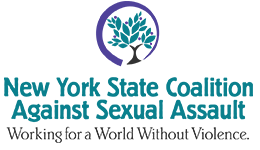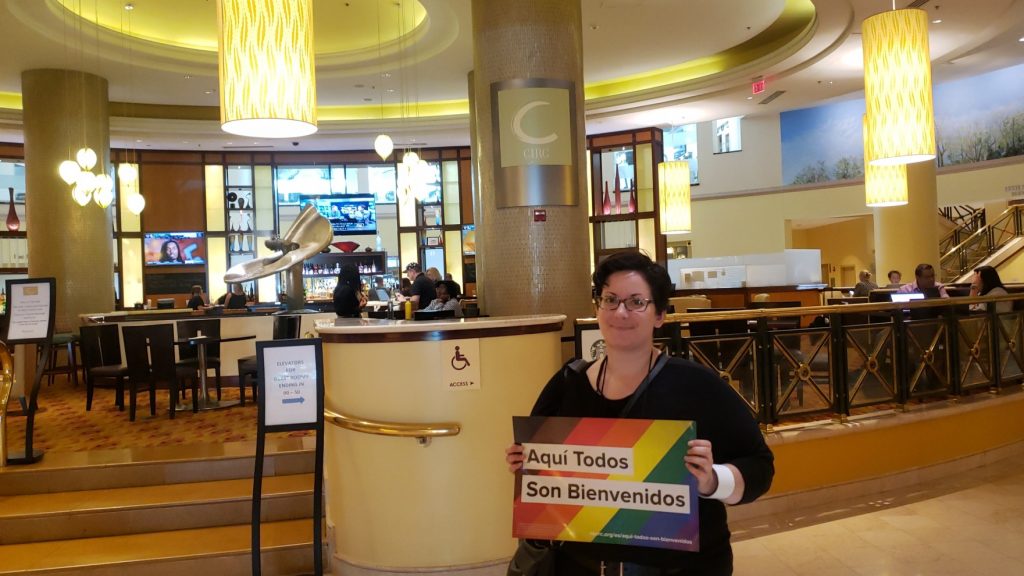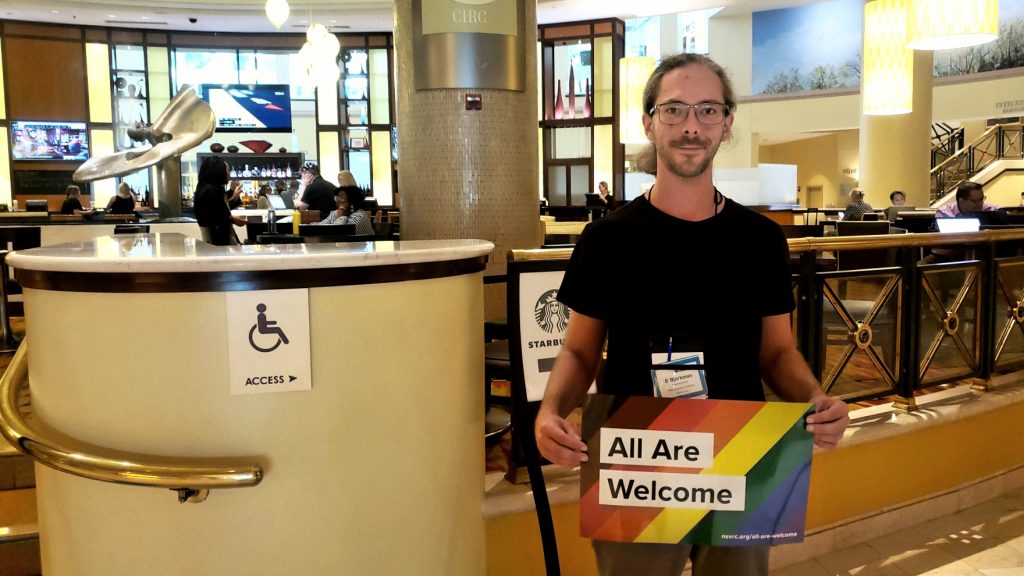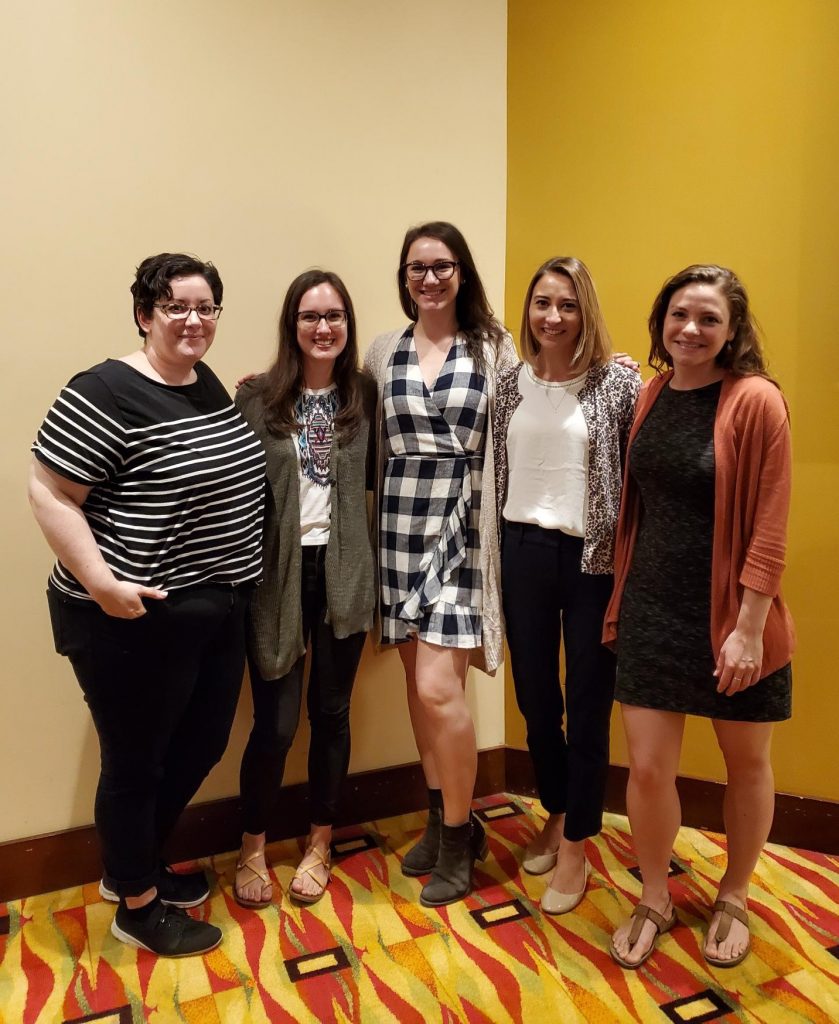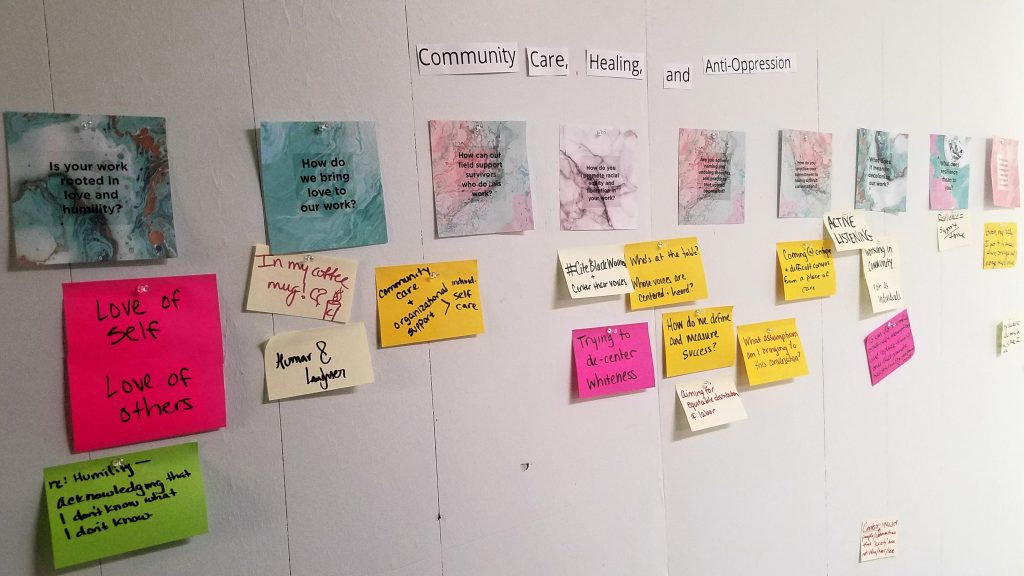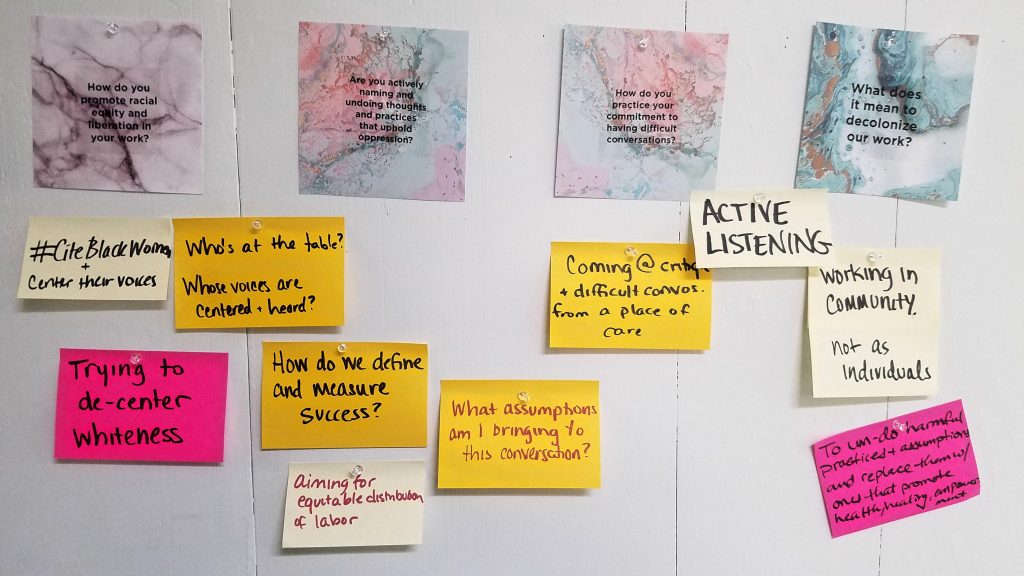27 Sep Reflections on ‘Beyond the Breakthrough’ and Social Justice/Anti-Oppression Work
—E Bjorkman and Chelsea Miller
In August 2019, E Bjorkman (PREA Outreach Director) and Chelsea Miller (Communications Director) attended the National Sexual Assault Conference. This year’s theme, “Beyond the Breakthrough,” focused on ways to best support survivors who have long been overlooked by mainstream sexual assault services and critically examined the role of oppression in fostering sexual violence and determining who can access sexual assault services and what services are provided.
Toward an Anti-Oppression Framework Beyond the Breakthrough
NYSCASA recognizes that oppression is the root of sexual violence. We realize that in order to eliminate sexual violence, we also need to dismantle oppression.
The mainstream movement to end sexual violence has largely relied on the criminal legal system and legislative strategies to prevent and respond to sexual violence. Such strategies do not account for the role of oppression in sexual violence. They have also brought many survivors of violence into conflict with the law and exposed survivors to potential re-traumatization within the criminal legal system.
The traditional criminal legal system doesn’t necessarily offer healing or justice for all survivors, nor does it offer adequate paths to accountability for people who have done harm. When we rely on systems that have historically targeted marginalized groups, we create a feedback loop that keeps people in the system and labels them as ‘dangerous,’ focuses on punishing the individual, and allows no room for transformation or growth. Using state systems also sidesteps the reality that the state can do harm and can further harm survivors, making it impossible to hold some people accountable for their actions.
Adopting an anti-oppression framework helps us chart other paths toward healing for survivors and accountability for people who do harm. At last month’s NSAC, we attended sessions that encouraged us to think through ways to effectively incorporate an anti-oppression framework in our efforts to end sexual violence.
Calling in to Social Justice and Anti-Oppression Work
In LaQuisha Anthony’s workshop, “This Is America: Using an Anti-Oppressive Framework for Sexual Violence Prevention,” we explored how we can effectively call people into social justice work. We discussed how popular music has challenged oppression over time by analyzing the lyrics of anti-oppression anthems like Childish Gambino’s “This Is America,” Tupac’s “Changes,” and Aretha Franklin’s “Respect.” We examined how each songwriter identified a form of oppression and called on listeners to challenge it. We saw how it’s possible to get people on board with anti-oppression work through effective calls to action, even when—and especially when—it’s scary to take action.
Nubia Peña’s workshop, “Social Justice as Prevention Framework,” encouraged programs to incorporate a social justice framework to inspire and develop engaged youth leaders. The workshop emphasized using culturally relevant education to address the polarized political climate around immigration, race relations, civil rights, LGBTQ+ rights, and lack of support for survivor narratives. We learned that making space for people to share their experiences helps create an inclusive, intersectional, and survivor-centered prevention strategy. The big takeaway from this workshop is that we can trust that healing is possible within the connections available in the community. Taking a social justice stance means that we give space for cultural sharing and community building, which creates a support network that is tangible, accessible, and interconnected. A thriving community with valued members is not only the end goal, but prevention in action as well.
Organizational Anti-Oppression Work
We also attended workshops that addressed ways that organizations can effectively work against oppression. In both workshops, we asked: if we don’t address oppression in our own organizations, how can we effectively support survivors of sexual violence and end sexual violence?
In “Advocating for Each Other: Supporting Survivors in Anti-Rape Work,” Shundrea Trotty (Iowa Coalition Against Sexual Assault) shared ways that our agencies can create a survivor-centered and social justice-informed organizational culture. In particular, we devoted a substantial amount of time to discussing trauma-informed and introspective supervision and relationship building. An agency is survivor-centered when it: realizes the widespread impact of trauma and understands potential paths for healing; recognizes the signs and symptoms of trauma in clients/survivors, families, staff, and others; responds by fully integrating knowledge about trauma into policies, procedures, and practices; and seeks to actively resist re-traumatizing survivors.
In “In the Mirror: Breaking Through, Inside Out,” Katryn Duarte and Adam Robinson (University of Iowa Rape Victim Advocacy Program) led us through the process of recognizing and attempting to dismantle oppressive policies and practices within their own organization. The facilitators shared stories about how staff with marginalized identities have been repeatedly othered and hurt by white, cisgender leadership in the organization. They also shared how the staff as a whole is working through these challenges, and what steps leadership has taken to acknowledge harm done, take responsibility, repair harm, and change their behaviors.
In both of these workshops, we discussed the ways in which supervisors or people in leadership positions can uphold or challenge oppression within the organization. We learned about how supervisors can, often unintentionally and despite their best intentions, cause harm to staff with marginalized identities. We also heard how supervisors can use introspective supervision styles that are trauma-informed and healing-centered and which best support survivors and staff with marginalized identities.
We also learned that cultural shift requires shared definitions of trauma and understanding; safety and stability; cultural humility and responsiveness; compassion and dependability; collaboration and affirmation; and resilience, recovery, and healing. Workshop facilitators challenged us to interrogate how our agencies define these components of a trauma-informed and healing-centered organizational culture, and if we have integrated them into our work. Not all of our agencies had.
Anti-Oppression Work at NYSCASA
NYSCASA’s anti-oppression work takes many forms:
- Sharing our varied perspectives and experiences via our new Community Care, Healing, and Anti-Oppression vision board: Using prompts created by Elevate | Uplift, we respond to questions about how we as individuals and as an organization incorporate anti-oppression, survivor-centered, and decolonizing lenses into our work.
- Working in coalition and partnerships: We acknowledge that we don’t know what we don’t know, so we prioritize community partnerships to fill in the inevitable gaps. We’ll be collaborating with Seven Dancers Coalition, the Indigenous anti-violence coalition in New York and Haudenosaunee Country, on future programming. We are also co-creating a conference with Seven Dancers Coalition and the Interrupting Criminalization: Research in Action project at the Barnard Center for Research on Women, in which participants will learn how to practice community-centered approaches to preventing and responding to sexual violence.
- Centering the voices of survivors, especially in PREA work: In the New York State PREA Project, we’ve been making efforts to ensure that advocates who will be working with incarcerated survivors hear from currently or formerly incarcerated survivors in trainings whenever possible.
- Calling on leadership in the room: We challenge our leadership regularly to address oppressive policies and practices, implement trauma-informed policies and practices, and address micro-aggressions.
This is not an exhaustive list.
None of us are perfect, and we still have a lot of work to do.
Building individual and organizational awareness isn’t a linear process. It’s helpful to take a ‘both-and’ stance when looking at how much is left to do and how much has already been accomplished. It’s important to acknowledge those who’ve come before us and praise progress, but it’s also important to continue to seek out areas to improve. Much like the work we support around responding to sexual violence; building organizational support is about strengthening relationships.
Please join us in 2020 for our webinar series (details to come) in preparation and celebration of the 2020 conference, Ending Violence Without Violence: Community-Centered Approaches to Sexual Violence Prevention and Intervention!
- Chelsea Miller, Communications Director
- E Bjorkman, PREA Outreach Director
- Our Communications Director, Chelsea Miller, met up with some communications staff from other state coalitions! Pictured: Chelsea (NY), Alix Mammina (NJ), Jessica Lahr (MT), Marissa Marzano (NJ), and Maria Swoboda (AK)
- Community Care, Healing, and Anti-Oppression vision board in NYSCASA office
